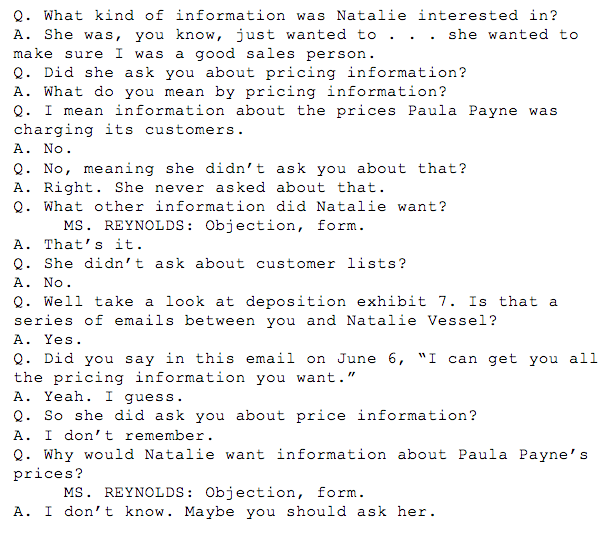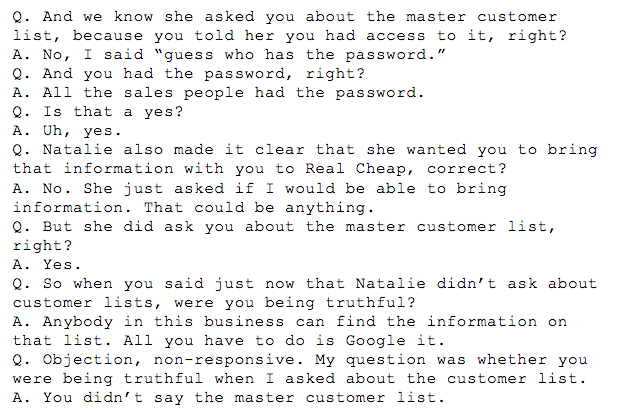
Scratch that. There is one thing better: when the person you’re suing changes his story after you confront him with bad emails he didn’t know you had.
Let’s consider a hypothetical.
Paula Payne Windows v. Dawn Davis
Dawn Davis was a salesperson for Paula Payne Windows, a wholesaler that supplies windows to builders in the construction industry. Paula Payne maintained a Master Customer List containing detailed information about all of its customers.
Dawn had a friend, Bob Coldstone, who did marketing for Real Cheap Windows, one of Paula Payne’s competitors. In June 2016, Bob emailed Dawn to set up a meeting with Natalie Vessel, the owner of Real Cheap. Bob said Natalie wanted to discuss Dawn joining Real Cheap.
The series of ensuing emails between Dawn and Natalie included these statements:
- Dawn: “I can get you all the pricing information you want. I know my way around the network here like nobody else.”
- Natalie: “Will you be able to bring all the information you need with you?”
- Dawn: “The master customer list is password-protected, but guess who has the password?”
- Natalie: “I hope Paula Payne will drop this idea of going after our customers.”
One month later, in July 2016, Paula Payne had a senior sales staff meeting to discuss moving more aggressively into a sales territory dominated by Real Cheap. Dawn Davis pushed back on the idea, saying that it would be difficult to compete with Real Cheap on prices, and that Paula Payne should focus on its existing customers. Heeding Dawn’s advice, the sales team dropped the idea.
In November 2016, Dawn announced to Paula Payne that she was leaving the company. A day before leaving, Dawn emailed Paula Payne’s master customer list to her personal gmail account and copied all of Paula Payne’s sales records for the past 90 days to a USB drive.
After Dawn left, most of her customers stopped buying windows from Paula Payne. The company then discovered Dawn was working for Real Cheap. Dawn was selling windows to her customers from Paula Payne and starting to solicit additional Paula Payne customers.
Dawn’s Deposition Testimony
Paula Payne sued Dawn Davis and Real Cheap Windows, claiming breach of Dawn’s non-compete, breach of fiduciary duty, and misappropriation of trade secrets. When Paula Payne’s lawyer took Dawn’s deposition, this exchange happened:
At trial, Paula Payne’s lawyer played the video of this portion of Dawn’s deposition. After finding that Dawn and Real Cheap misappropriated trade secrets, the jury found lost profits damages of $989,000, the amount calculated by Paula Payne’s expert.
Afterwards, one member of the jury commented to Dawn’s lawyer, “your client seemed pretty nice, but those emails just killed her.”
So where did Dawn Davis and her lawyer go wrong?
How Not to Handle Bad Emails
Paula Payne v. Dawn Davis is a case study in how not to handle bad emails in litigation. If you want to maximize your client’s exposure at trial, here’s what you should do.
1. Don’t find bad emails ahead of time and discuss them with your client
The first time Dawn’s lawyer focused on the emails marked as deposition exhibit 7 was in the deposition. By then, Dawn had already blown her credibility by making statements in conflict with the obvious import of the emails.
You need to know about the bad emails ahead of time. This point is obvious, but neglected more often than you might think.
Plus, even when lawyers are diligent, reviewing every email isn’t always feasible. Sometimes the volume of documents is just too large. Some clients can’t afford to pay for a team of BigLaw associates to review and code every document.
If finding all the bad emails ahead of time isn’t practical, then at least admonish your client to tell the truth and not to trust her memory too much. People have a great capacity to remember things happening in a way that supports their position. (This is true—I’m not just being sarcastic). When Dawn said Natalie never asked about prices, she may have thought that was true, but that’s the kind of statement a witness shouldn’t make unless she’s absolutely sure.
2. Conceal and delay as long as possible
If you do find the bad emails ahead of time, what do you do with them? Let’s assume that Dawn’s lawyer found the bad emails on Dawn’s hard drive but didn’t produce them in discovery. The problem was that Paula Payne’s forensic expert found them by restoring deleted emails on Paula Payne’s server.
This leads to the worst of both worlds: the bad emails eventually come out and they look even more incriminating because Dawn concealed them.
3. Pretend bad emails don’t mean what they obviously mean
It’s a deposition ritual to ask the witness to admit that a bad email means what it obviously implies, even if it doesn’t say it explicitly. Take Natalie’s statement, “I hope Paula Payne will drop this idea of going after our customers.” What should Dawn say when asked if Natalie was asking her to make sure Paula Payne dropped the idea?
It always depends on the circumstances, but if it’s obvious that Natalie was asking Dawn to stop Paula Payne from going after Real Cheap’s customers, then Dawn should freely admit that. Don’t pretend a bad email doesn’t mean something that everyone on the jury will know it means.
4. Dispute everything rather than focusing on your strong points
There is a certain type of litigator that follows an easily recognizable playbook: Contest every issue. Concede nothing. Attack on all fronts.
That approach can have short-term benefits, but it usually doesn’t end well. Plus, it tends to cost the client more money. It is usually better to concede the bad facts you ultimately can’t avoid, and to focus your efforts on the good facts that help you.
For example, Dawn Davis didn’t want to concede that she took Paula Payne’s master customer list to her new employer, Real Cheap. Perhaps a better approach would be for Dawn to admit she took the list, but to focus on the argument that the list is not a trade secret. If it’s true that anyone in the industry can readily construct the same list of builders who buy windows, then Dawn and her lawyer should focus on that fact.
5. Don’t have your client practice answering questions about bad emails
The first four tips are great in theory, but they won’t help your client much if you don’t practice. Answering tough questions about bad emails is not easy. Rehearse how your client will answer hard questions about bad emails ahead of time.
And be careful responding to emails after 10 pm when you’ve had a long day at work. That’s how bad emails are born in the first place.
_____________________
Zach Wolfe (zach@zachwolfelaw.com) is a Texas trial lawyer who handles non-compete and trade secret litigation at Zach Wolfe Law Firm (zachwolfelaw.com). Thomson Reuters named him a Texas “Super Lawyer”® for Business Litigation in 2020, 2021, and 2022.
These are his opinions, not the opinions of his firm or clients, so don’t cite part of this post against him in an actual case. Every case is different, so don’t rely on this post as legal advice for your case.







Comments:
Excellent post! Just what I was looking for.
Great post. The last paragraph is the best.
Sent from my iPhone
>
Thought you might like that